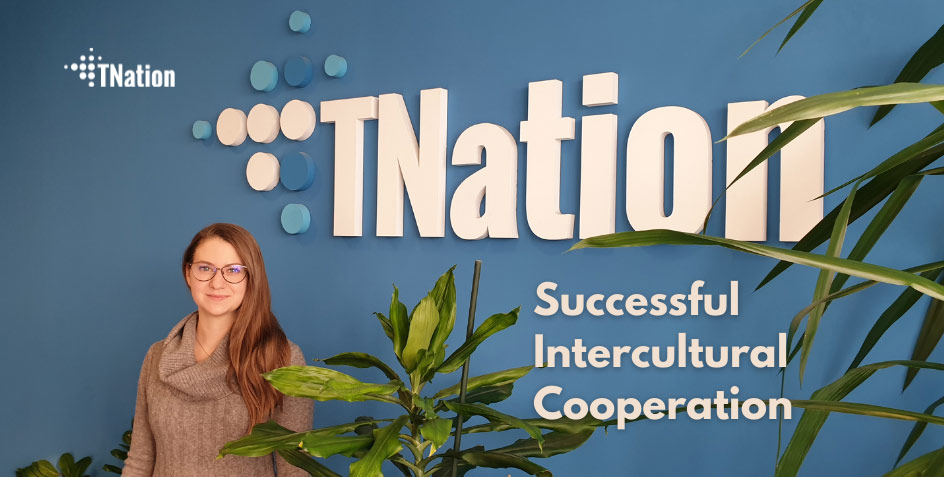Steve Jobs once said: “Great things in business are never done by one person. They’re done by a team of people.” The core of outsourcing and nearshoring software development are people, developers, to be precise. Outsourcing means seeking expertise for specific projects in other companies, sometimes in different countries or continents.
Numerous online articles cover how business owners hesitate to outsource their tasks abroad because of temporal, organisational and intercultural differences. TNation’s Java development team member Marija Milčić is working on a project as a part of a cross-cultural virtual team. In the following text, she shares her personal experience when it comes to cultural differences in outsourcing.
Three Cross-Cultural Communication Challenges In A Wireless World
It is a fact that communication factors play an essential role in outsourcing software development. Many American companies are reluctant to contract offshore resources in Eastern Europe or Asia because of language, cultural or time zone barriers. Therefore they are more inclined to hire partners within their homeland.
However, stereotypes based on personal experience are some of the most common barriers to hiring offshore software development companies. But, as in any culturally diverse workplace, it depends on whether the offshoring company cultivates a culture that supports international openness and diversity.
TNation’s Marija Milčić started working on projects right after her academic and master studies at the Faculty of Organizational Sciences. She is now a Java developer at TNation with several successful projects and plenty of experience working with foreign clients. We looked at the three challenges while outsourcing software development in a cross-cultural virtual team. Marija drew on her adventure with the client’s team as a Java developer, where she spent a year working with people from different countries, cultures and backgrounds.
Time+Distance=Delay
The first thing that comes to mind when considering the challenges of global cross-cultural teamwork is time zone difference. As it happens, nothing beats speaking to somebody in person, especially when it comes to software development. However, when working with remote teams, more often, this is not an option. Time is often of the essence in projects, especially when there are challenges. If the team member is across the globe, their working hours are different, so clients cannot reach them in real-time. The time difference is the reason why many businesses seek professionals in their homelands.
The truth is it depends on the policy of the outsourcing company and the way they adjust their working hours to the clients time zone. Java developer Marija has worked with a remote team for a year. We asked her about her perspective on time differences in international groups.
Given that there is a time zone difference between Serbia and clients countries, how do you approach communication with them?
“Depends on the country, but usually we find each other in the middle.” Answers Marija with a smile and adds: “I work by CET time at the moment, and we organise meetings and pair programming during working hours.”
Lost in Translation
Some developers do not have English proficiency and are not capable of conveying their ideas properly. So, some things genuinely get lost in translation. Suppose the outsourced and in-house team can not bridge the language barrier. In that case, there is a good possibility that the project will suffer. Understanding the requirements is vital for the project.
But, as it happens, the education system in Serbia has long addressed the preparedness for foreign languages, and almost half of the nation speaks and understands English. Marija is English proficient, but as her career in software development started, she admits there were challenges while meeting with foreign clients.
Did you ever have a language barrier while working for offshore clients?
“I was scared initially because of language differences, but as soon as I started working, I lost that barrier and fear. When I started working for foreign clients for the first time, the introduction was business-oriented, so I focused on understanding the workflows and processes of the client and forgot about language.”
No Cable Media
Despite the modern solutions for different ways of communicating, technology is never perfect. For example, email, Slack, Skype and other text-based communication applications do not allow the interlocutors to gauge another person’s emotions and intent as they would in person.
Team members often misconstruct the meaning behind the written words, which adds to the unnecessary communication stress. There is also a question of connection loss, or some other technology induced challenge, that represents an obstacle in meetings and project completion. According to Marija, these types of challenges are the most common ones. In the end, she claims it depends on team effort to make the best out of the situation.
Does remote communication with the client’s team take away something from the communication about the project instead of meeting in person?
“Well, it’s always easier to work and talk in person. But, when something like that is not possible, we need to put effort into learning about other people and ways to communicate with them.”
The Positive Side of Cultural Differences in a Team
The globalised digital world knows no distance, borders, or time. As a result, more people work in teams distributed around the world, connected with technology. Communication plays a vital part in virtual teamwork regardless of the project’s nature.
As globalisation touches every household in the world, there is little or no chance that the people do not know at least something from the culture of another team member. So building a virtual team is not just hiring the right set of skills of each team member, and it goes beyond simple delegation of the task.
Like in any company, the team members work on the same project and drive it towards completion. It is the same with virtual team members. Building a solid sense of teamwork and relationship between the members is as important as knowledge and expertise. Cultural differences do not have to be a primary obstacle in outsourcing. Furthermore, it can be the strength necessary to drive the shared vision of their objectives in some cases.
The advantage of an intercultural team is more than bringing diverse perspectives together. There is a positive side to outsourcing, and when that happens, it is like magic for the project outcome. Even though they belong to different cultures, the team members come together with the same goal in mind.
Imagine putting together people with different values, priorities, diverse religions, work ethics, personal differences. It almost sounds like a traditional team, but what happens when Marija enters an in-house team from a different country?
What is the most exciting part while joining the new team for offshore clients?
“Everything! Not sure what I would answer. Because truly everything is fun – meeting new people and understanding their culture and way of working, then adapting to new code style and learning about new business.”
Learning about new cultures and their preferences creates interaction between team members. This interaction creates learning, innovation, increases performance, empathy and consolidates the power of a better working environment for intercultural teams. In addition, those who respect their teammates and their cultural differences earn trust. Trust is something that is won over time and creates a strong bond within a team.
To Marija, the differences are an exciting part of being a part of a cross-cultural team. She recalls that she enjoyed learning about the people she works with and reciprocates the same interaction.
Are there differences in communication, negotiation, decision-making, and work organisation in client companies?
“Yes and no, teams are more and more international, each person is different, so is communication and interaction between each of us. That’s the funniest part, we learn a lot about each other’s preferences, about the culture where we live, about lifestyles, and that improves our collaboration.”
Multicultural teams are not always the challenge for business; they are also the positive side of having diversity with the same goal. That objective drives the project toward completion with increased productivity while consolidating friendship, innovating, and developing their IT careers.
Addressing the Cultural Differences Challenge
There is a certain level of precaution when it comes to choosing an outsourcing partner from another country. The truth is that if we cannot attempt and try and understand the culture of the people we work with, then there is no positive outcome for the project. In general, people around the world know western cultures.
The bottom line is that global virtual collaboration allows intercultural team members to carefully consider and convey how to accomplish specific tasks. In addition, the company itself should nourish a collaborative culture. Trust and openness are essential for outsourcing success. And it all starts with the company and spreads through business.
An effort that individual team members make to understand better their colleagues has a much deeper meaning and outcome for all parties involved. We asked Marija how she fits in her latest team, and she responded with a smile:
“So far, so good and without problems. I think I fit well, but it’s better to ask my teammates.”
TNation is a nearshore software development and outsourcing company. We have years of experience in developing software for various industries. Let us know if we can help you in any way.





